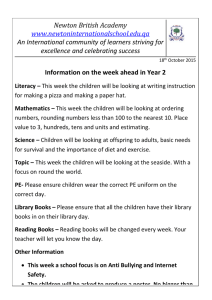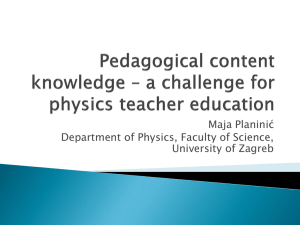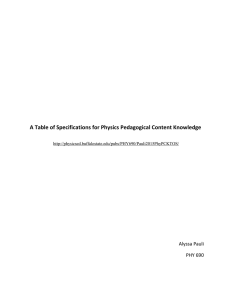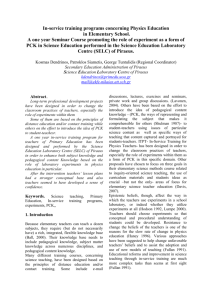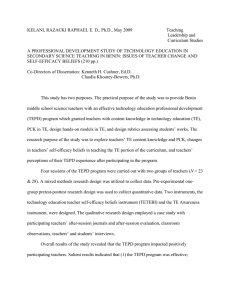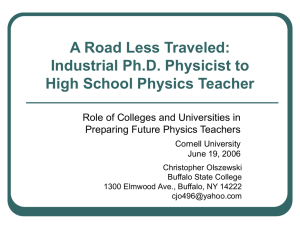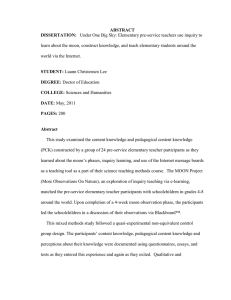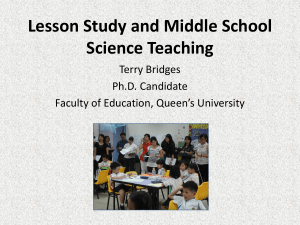Pedagogical Content Knowledge: Models & Implications
advertisement
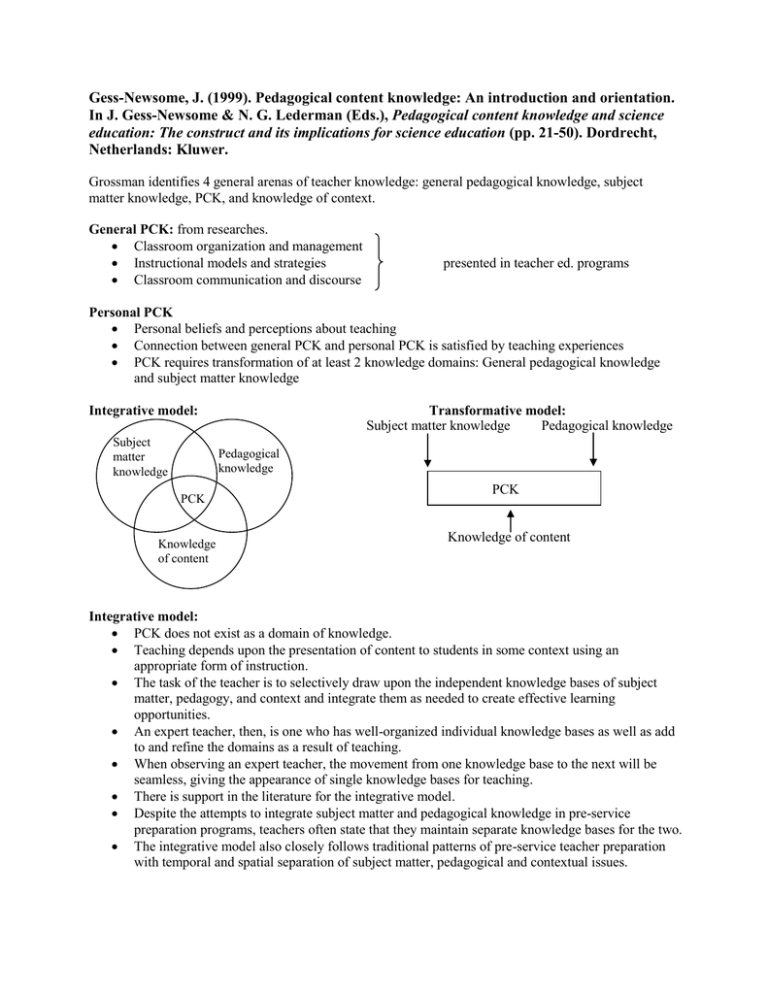
Gess-Newsome, J. (1999). Pedagogical content knowledge: An introduction and orientation. In J. Gess-Newsome & N. G. Lederman (Eds.), Pedagogical content knowledge and science education: The construct and its implications for science education (pp. 21-50). Dordrecht, Netherlands: Kluwer. Grossman identifies 4 general arenas of teacher knowledge: general pedagogical knowledge, subject matter knowledge, PCK, and knowledge of context. General PCK: from researches. Classroom organization and management Instructional models and strategies Classroom communication and discourse presented in teacher ed. programs Personal PCK Personal beliefs and perceptions about teaching Connection between general PCK and personal PCK is satisfied by teaching experiences PCK requires transformation of at least 2 knowledge domains: General pedagogical knowledge and subject matter knowledge Integrative model: Subject matter knowledge Transformative model: Subject matter knowledge Pedagogical knowledge Pedagogical knowledge PCK Knowledge of content PCK Knowledge of content Integrative model: PCK does not exist as a domain of knowledge. Teaching depends upon the presentation of content to students in some context using an appropriate form of instruction. The task of the teacher is to selectively draw upon the independent knowledge bases of subject matter, pedagogy, and context and integrate them as needed to create effective learning opportunities. An expert teacher, then, is one who has well-organized individual knowledge bases as well as add to and refine the domains as a result of teaching. When observing an expert teacher, the movement from one knowledge base to the next will be seamless, giving the appearance of single knowledge bases for teaching. There is support in the literature for the integrative model. Despite the attempts to integrate subject matter and pedagogical knowledge in pre-service preparation programs, teachers often state that they maintain separate knowledge bases for the two. The integrative model also closely follows traditional patterns of pre-service teacher preparation with temporal and spatial separation of subject matter, pedagogical and contextual issues. A potential danger in this model is that teachers may never see the importance of content over pedagogy, resulting in transmission modes of teaching with little regard for content structure, classroom audience, or contextual factors. Transformative model: The transformative model recognized the value of a synthesized knowledge base for teaching. PCK that helps students to understand specific concepts is the only knowledge used in classroom instruction. While knowledge bases containing subject matter, pedagogy and context exist, they are latent resources in and of themselves and are only useful when transformed into PCK. Teacher can justify their instructional decisions within the domain of PCK; teasing apart of teaching knowledge into its related forms is best left to researchers and theoreticians. An expert teacher, then, has well formed PCK for all the topics commonly taught. All teaching knowledge is contextually bound, potentially making transfer or drawing generalizations across teaching episodes difficult. The danger in this position is that it ignores context as it objectifies teaching knowledge, potentially implying that correct teaching practices exist for given topics to specific audience The classroom becomes primary location of teacher knowledge, calling into question the value of decontextualized declarative and procedural knowledge and teacher preparation as it currently exists Overview of Integrative and Transformative models of teacher cognition Integrative Model Transformative Model Knowledge domains Knowledge of subject matter, pedagogy, and context are developed separately and integrated in the act of teaching. Each knowledge base must be well structured and easily accessible Knowledge of subject matter, pedagogy, and context, whether developed separately or integratively, are transformed into PCK, the knowledge base used for teaching. PCK must be well structured and easily accessible Teaching expertise Teachers are fluid in the active integration of knowledge bases for each topic taught Teachers possess PCK for all topics taught Implications for teacher preparation Knowledge bases can be taught separately or integrated. Integration skills must be fostered. Teaching experience and reflection reinforces the development, selection, integration, and use of knowledge bases. Knowledge bases are best taught in an integrated fashion. Teaching experience reinforces the development, selection, and use of PCK. Identify teacher preparation programs that are effective. How can transfer and integration of knowledge best be fostered? Identify exemplars of PCK and their conditions for use. How can these examples and selection criteria best be taught? Implications for research Categories contributing to PCK Pedagogical knowledge Knowledge of learners and learning Assessment Procedures, Evaluation of outcomes Educational ends, Goals, Purposes, and values PCK Knowledge of specific contexts Knowledge of general educational contexts Curriculum knowledge Content knowledge Facets of Pedagogical Knowledge Instructional models and strategies Classroom communicatio n and discourse Classroom management and organization General pedagogical knowledge Reflection Personal beliefs/ perceptions Personal pedagogical knowledge Content specific pedagogical knowledge Personal practical experience Ball, D. L. (2000). Bridging practices: Intertwining content and pedagogy in teaching and learning to teach. Journal of Teacher Education, 51, 241-247. Teachers need to know things like what topics children find interesting or difficult or the representations most useful for teaching a specific content idea. PCK – representations of particular topics and how students tend to interpret and use them, e.g. or ideas or procedures with which students often have difficulty – describes a unique subject-specific body of PK that highlights the close interweaving of subject matter and pedagogy in teaching. Bundles of such knowledge are built up by teachers over time as they teach the same topics to children of certain ages, or by researchers as they investigate the teaching and learning of specific mathematical ideas. PCK is a special form of knowledge that bundles mathematical knowledge with knowledge of learners, learning, and pedagogy. These bundles offer a crucial resource for teaching mathematics, for they can help the teachers anticipate what students might have trouble learning, and have ready alternative models or explanations to mediate those difficulties. No amount of PCK can prepare a teacher for all of practice, for a significant proportion of teaching is uncertain.
